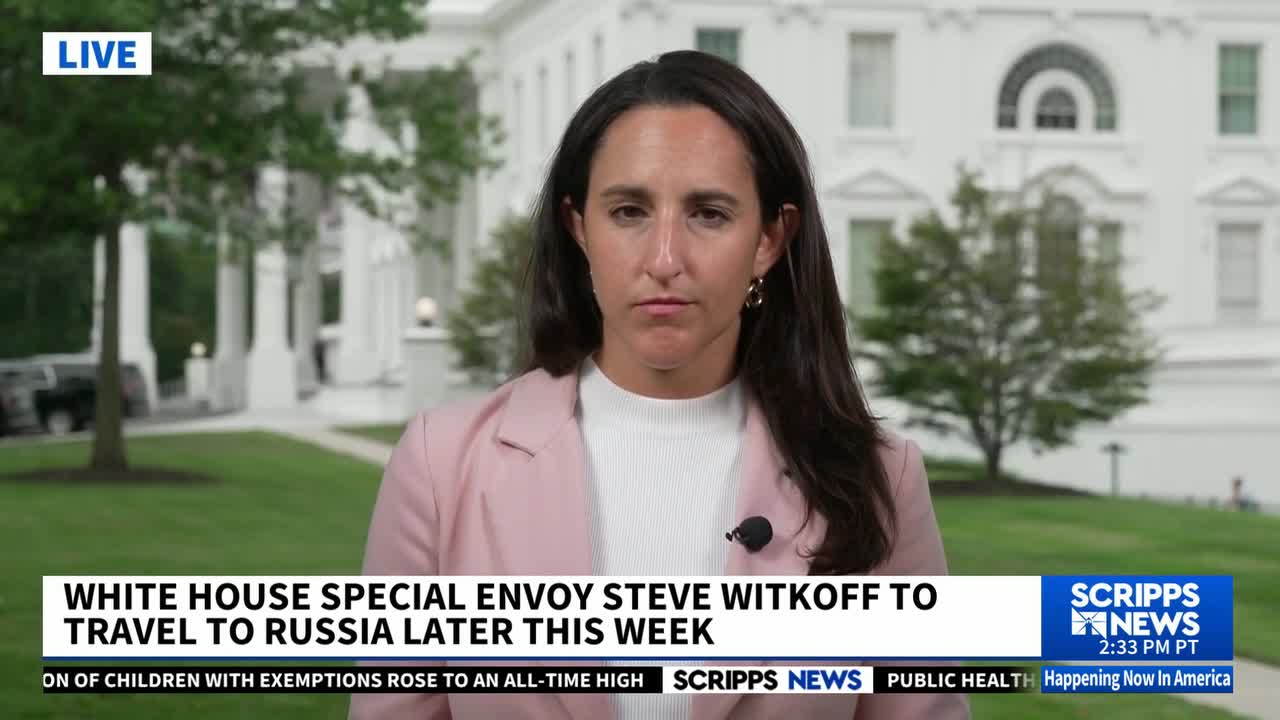Special Envoy Steve Witkoff is expected to meet with Russian leadership Wednesday, according to a source familiar with the plans, ahead of President Donald Trump’s deadline for Russia to reach a deal in its war against Ukraine or face steeper sanctions.
“We have a meeting with Russia tomorrow. We're going to see what happens at, we'll make that determination at that time,” Trump said Tuesday.
Trump issued an ultimatum to Russia last month that gave Putin 50 days to reach a ceasefire or face tariffs and secondary sanctions, but amid Trump’s disappointment in Russian President Vladimir Putin over a lack of progress, Trump deemed “there’s no reason to wait” and shortened the deadline to this Friday.
The meeting is an information gathering meeting for Witkoff, according to a senior administration official, that came at the request of Russians.
“Get a deal when people stop getting killed,” Trump told reporters of Witkoff’s message and what Russia could do to avoid sanctions over the weekend.
“There'll be sanctions, but they seem to be pretty good at avoiding sanctions. You know, they're wily characters and they're pretty good at avoiding sanctions. So we'll see what happens,” Trump said Sunday.
Countries including India and China are among Russia’s major energy consumers. Trump threatened to increase tariffs against India over it. “We settled on 25% but I think I’m going to raise that very substantially over the next 24 hours, because they’re buying Russian oil, they’re fueling the war machine. And if they’re going to do that, then I’m not going to be happy,” Trump told CNBC’s “Squawkbox” in an interview with the show today.
“It's also the other financial and economic trades that are going on that kind of happen in the wake of this very large, dark, fleet and pipeline petroleum trade that they're doing,” Brent Sadler, a senior research fellow with the Heritage Foundation, said o Russia. “So I don't think it's going to impact China. We'll see if there's some kind of quid pro quo in the August 12 trade negotiations, which I would be surprised if China's continued purchase of Russian oil doesn't come up, but I get that low odds of having an impact or changing what China is doing for Russia.”
The threat of secondary sanctions comes as US and Chinese officials have continued trade talks ahead of the Aug. 12th deadline of a pause in higher tariff rates. Some question whether the administration would levy large secondary sanctions amid the trade negotiations.
“If Trump wants to pressure Russia, there are clear ways to do so: tighten sanction loopholes; match the EU by lowering the price cap on Russian oil; ask Congress for additional money to assist Ukraine; and work with the EU to seize Russia's frozen Central Bank assets and transfer them to a fund for Ukraine to use to purchase arms and finance reconstruction. Those steps would make clear to Putin that the military and economic costs of continuing the war will only grow for Russia,” former ambassador to Ukraine Steven Pifer, who is also an affiliate at Stanford’s Center for International Security and Cooperation.
RELATED STORY | Trump says he's moving up Russia ceasefire deadline amid new attacks on Ukraine
The White House’s efforts to end the war have yet to result in a ceasefire or peace deal between Ukraine and Russia, and as the war in Eastern Europe stretches into the three-and-a-half-year mark. The administration does not expect a peace deal between Russia and Ukraine out of the meeting.
“We thought we had that settled numerous times and then President Putin goes out and starts launching rockets into some city like Kyiv and kills a lot of people in nursing home or whatever,” Trump said last month.
Trump, who has spoken to Putin multiple times during his second term in office, has expressed frustration with Putin in recent months as Russia continued its assault on Ukraine. He’s since announced a deal that allows NATO allies to buy American weapons in efforts to supply Ukraine, moved two nuclear submarines to the “appropriate regions” in response to what he called “highly provocative statements” by former Russian President Dmitry Medvedev and taken a sharper tone towards Putin than in the beginning of his administration.
“I would be surprised if the Russians aren't going to try to string along Witkoff or try another delay tactic, or try to try to lull them into a full sense that now they're willing to play ball. The reality is, until the Russians actually do something, not just words and niceties, but actually demonstrate that they have changed their behavior in a meaningful way that can be verified before any further trade negotiations, or any other negotiations, rather threatening the war in Ukraine. I think that's what's got to happen first,” said Sadler.
Ahead of the meeting, President Trump and Ukrainian President Volodymyr Zelenskyy spoke Tuesday, according to a White House official and the Ukrainian leader. Zelenskyy said the two “exchanged assessments of the situation,” “sanctions against Russia,” and “joint European decisions” that could help Ukraine’s defense. Special Presidential Envoy for Ukraine Gen. Keith Kellogg is also expected to meet with Ukrainians soon, according to a White House official.




